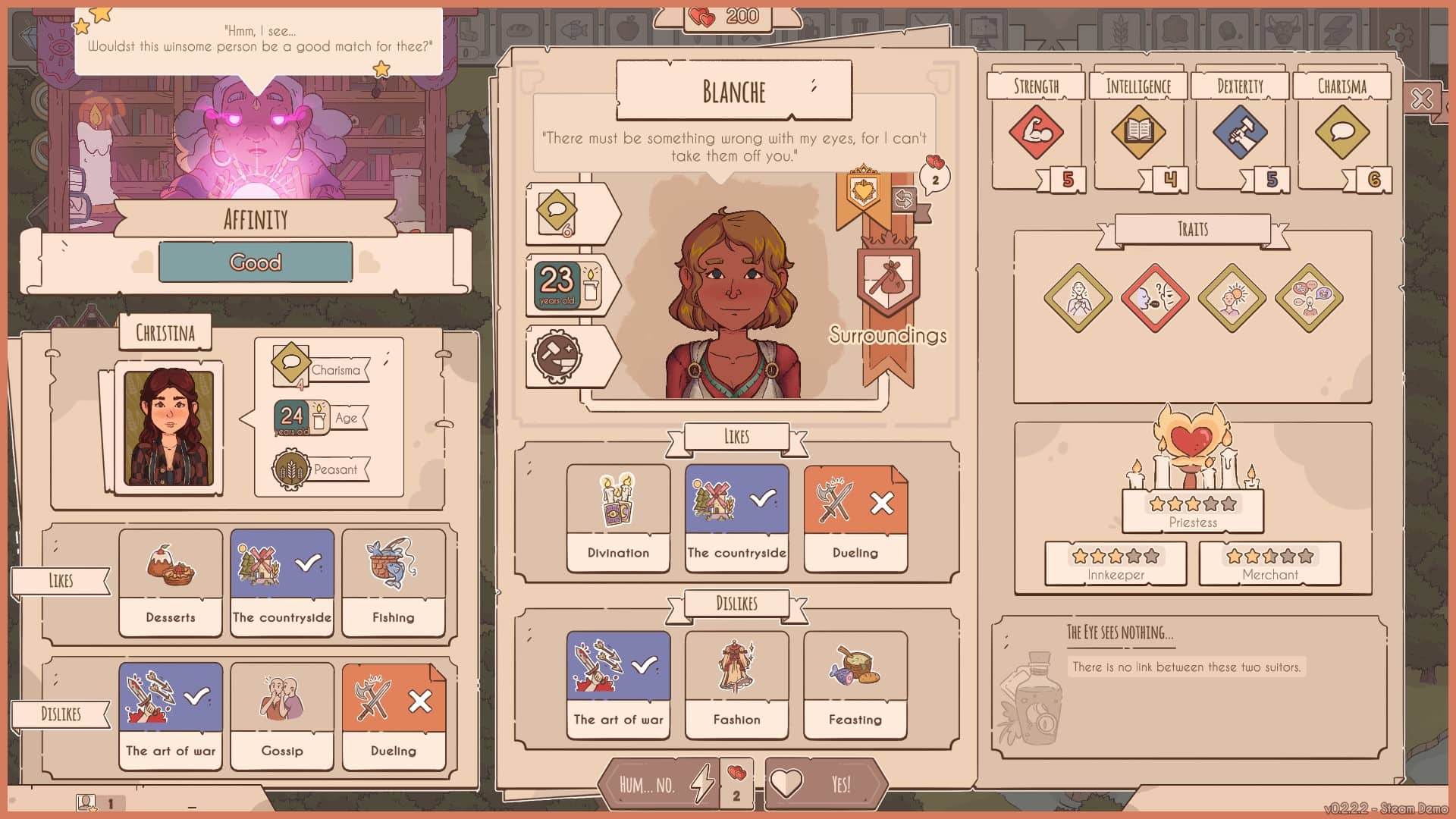
Lakeburg Legacies is at its best when it embraces drama
Have you ever wondered what medieval life would be like if they had a Tinder-alternative? Wonder no more, because Lakeburg Legacies answers that question with a simple answer: it’d be absolute chaotic.
With 10 different couples, babies pouring out of every orifice possible, and some idiot who’s crap at doing their job, and it’s making you waste resources, I quickly had my hands full during my time with Ishtar Games dating / life management sim. But, instead of feeling frustrated, Lakeburg Legacies thrills by putting the pressure on and rewards by allowing you a few in-game months of relative peace… before things start to get wild again.
The goal of Lakeburg Legacies is fairly straightforward: advance your village to a kingdom by governing the folk who live in Lakeburg, and then crown a sovereign. That’s how you win the game. Upgrading your village to a kingdom however takes work, and it isn’t as simple as putting everyone in their right roles, advancing the speed of in-game time and hoping for the best. No, no, no, you’ve got to focus on making your people happy, which means meeting their needs enough that they’ll want to keep on living and thriving in your village.
Players first start off with one villager, a lumberjack hut and some resources like food and clothes. However, your goal is to grow and expand so guess what? That means getting married! If you’ve been burned by other historical and medieval sims and are like ‘oh god no, does this game only make it so that I have to be in a heterosexual marriage?’ then fret not. Gay marriage is not only A-OK in this game, but you’re not given any debuffs of the sort which in-game speak means that like heterosexual couplings, you’ll be able to have children too. While I don’t necessarily mind debuffs in other games – it’s nice to have a game that lets us thrive.

To get married, you’ll need to head to your local hook up – a spiritual woman that uses her crystal book to find you matches in the surrounding area that may suit you. You’ll get to see your potential lover’s likes, dislikes, their skills, traits, and whether they are a peasant, artisan or a noble. In my time playing I wasn’t sure whether things like class affects the relationship, but your likes, dislikes and traits certainly do. If you marry someone who likes and dislikes the same things you do, the chance that you’ll have a happy marriage grows. On the other hand, if you marry someone who you dislike then you’ll earn the ‘loveless marriage’ trait. Yikes. What makes this concept so interesting though is that, sure you can look through person after person to find the one for your villager, but that costs ‘love’ – a resource in itself that lets players go on further dates after marriage, spend time with their significant other, etc. More importantly, sometimes there’s value in just grabbing someone who has the right traits you’re looking for, is good at a certain job that you don’t have covered in the village. It may not be a perfect marriage, but if it benefits the village then well? It’s a risky decision that I was willing to make.
It isn’t just marriage that plays a part though, you can also go out on dates, give each other gifts, and interact with them through conversation. Depending on how a character feels about someone else, the relationship may improve or deteriorate, and as always, doing these things comes with a cost, so you’ll have to choose whether or not to sacrifice your precious resources.
Speaking of sacrifice, there’s plenty of ways where you’ll have to make some hard decisions. Money can be awfully tight during the early game of Lakeburg Legacies, and sometimes you’ll get options to sell your precious resources to a wandering merchant for a few hundred, two hundred, coins. Money helps with upgrading your buildings so that you can get more stock and make sure everyone is well-fed, dry and clothed, but I found that I was far more desperate to increase the amount of storage of each resource which, again, doesn’t come cheap. You have to have at least 300 coins to increase storage and with money being so tight, I often found myself having to put things off and waste resources (despite how much doing that killed my soul) because I just simply didn’t have the gold or people to effectively help my village.

Much like medieval life, it can be gruelling to make these decisions but that’s where the drama of the dating sim comes in. As I mentioned above, not every marriage is happy and for each new villager that comes to town, more variables get added. One character of mine, a priestess called Morgana found herself harboring a secret crush on Jonah, the lumberjack. Both of them were in deeply unhappy marriages and had children, so what are they to do but have an affair and absolutely ruin everyone else’s life to pursuit their own happiness? I didn’t make it happen, but I certainly didn’t… not… encourage it? Anyway, Morgana’s husband Josef and Jonah’s husband Percy no longer allow them to see their kids. Yeah.
Yet for all this drama that unfolded, it doesn’t quite feel like enough for the game’s current state. At times it feels like I’m waiting for something to happen, even when I try to nudge people in the right direction by spending resources, there were plenty of times where I was just waiting for an event that would give me more of a choice to form bonds with the other villagers. They seem so few and far in between, and while I don’t want drama 24/7, the game truly shines when it digs deeper into the relationships between its many residents.
Despite the tricky and, currently, not-so-equal balance of the life management and dating sim features, my time with Lakeburg Legacies was worthwhile and fun. It brought the drama, the stress, and the feel-good glow of management. What’s not to like?
Lakeburg Legacies releases for PC on July 20, 2023.





